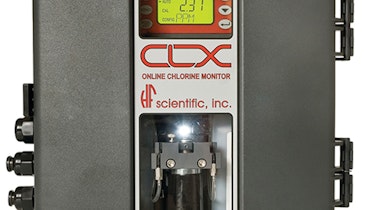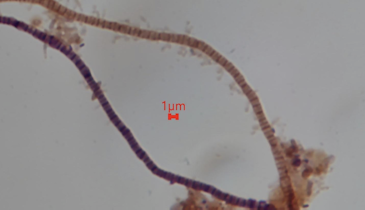
Sally Wright and Harris discuss upcoming projects while visiting the Dallas Central Wastewater Treatment Plant.
Interested in Education/Training?
Get Education/Training articles, news and videos right in your inbox! Sign up now.
Education/Training + Get AlertsWhen Rhonda Harris was 6 years old, she knew what she wanted to do: “I was going to be a civil engineer. I’m one of the few people who knew what they were going to do upon going to college.”
Little did she know that her career path would lead to becoming a trainer of wastewater, drinking water and stormwater professionals around the world. In recognition of her contributions, in 2019 she received the Kay Kutchins Education Leader Award, presented by the Texas Section American Water Works Association. Today she plies her engineering and training skills with the Brown and Caldwell environmental engineering and consulting firm.
Learning how it works
From the start of her career, Harris was intent on understanding water facilities. “I learned how to do everything surrounding design: surveying, drafting and running a treatment plant,” she says. “I always thought it made sense to learn how to do all the things that were entailed in the work. I thought I needed to know how to run the facilities I was going to design.”
Her mother was the first employee in the Federal Emergency Management Agency’s Region VI office in the Dallas area. Harris completed her college basics at Christian Brothers College (now Christian Brothers University) in Memphis, Tennessee, and then moved home to establish Texas residency. “Tuition in Texas was only $4 a credit hour, but everything else, like books and lab fees, was expensive. I had to work to pay for it,” she recalls.
Harris began her engineering studies at the University of Texas at Arlington in 1977 as one of only two women in the program. When she graduated in 1984, there were about a dozen women enrolled, and she graduated with five of them. She was older than all of them because she had worked her way through school.
An excellent mentor
Her experience and her degree earned her a job with Camp Dresser & McKee (now CDM Smith). She was assigned to a wastewater project at Dallas’ Central Wastewater Treatment Plant, where she worked with and learned from the chief operator, the late Richard Chapman.
“They wanted me to design a new headworks, and I needed to know more about it,” Harris recalls. “They put me with Richard, and he taught me how to operate a plant. I shadowed Richard for two or three years. He was great, one of the most amazing people I’ve ever met. He was patient with me. There were no other women out there in the plant, and there was one woman in the lab.
“So there I was in my mid-20s, chasing all over the plant, trying to learn how to operate it. They were very receptive and accommodating.” In 1994, she earned her Texas B water and wastewater operator licenses (second highest). “I’d been on the operations side of things for about 10 years then, doing pilot plant work and operating different systems for the engineering firm. Because of my experience, I was allowed to sit for the B exam.” She earned her A water operator’s license in 2003 and her A wastewater operator license in 2004.
Her career path took a turn in 1991 when the U.S. EPA Region 6 hired her to manage its new stormwater program. Her construction experience and the MBA she had earned at Southern Methodist University made her attractive: “By then I had designed and built several million dollars’ worth of drainage and infrastructure projects.”
Making the rules
EPA Region 6 was managing 90% of the stormwater permits then and developed the national rule-making. “I became the public face of Region 6 for the stormwater program,” she recalls. “I learned public speaking in a trial-by-fire setting. It’s how I learned to talk in front of crowds. Once you get comfortable with it, you can talk to anybody about anything.”
Those affected by the stormwater program called it the “rain tax,” and it was very unpopular. Industries that had flown under the radar for years became noticed and were regulated: “They came under EPA oversight and were required to follow EPA regulations, something they’d never had to do before. Farmers, ranchers, auto salvage yards, the petrochemical industry and others were all suddenly visible. The CAFO (concentrated animal feeding operations) rules came out of the NPDES system and stormwater regulation.”
After the program was up and running, Harris recognized a gap in her knowledge and left the EPA to work for KPMG, a multinational professional services network and one of the Big Four accounting firms. There she learned the financial side of utilities.
After a couple of years at KPMG, Harris made her biggest career move yet: going out on her own. She and a friend, Curtis Smalley, who worked at Brazos River Authority, formed a partnership to train water and wastewater operators all over Texas. They formed a company called Professional Operations (ProOps) and were preparing to make the leap when the Brazos River Authority gave Smalley a promotion and a large salary increase to keep him on board.
The ProOps years
Harris bought Smalley’s share of ProOps, launched the training venture in 1995 and operated the company full time for 16 years. She was an approved trainer for Texas Commission on Environmental Quality, the Texas licensing authority.
“I did a lot of certification training all over the state for various utilities, and I worked at a lot of Texas Water Utility Association Regional Schools,” Harris says. “TCEQ had approved me to teach about 20 courses, things like basic water and wastewater, water lab, wastewater lab, collection, distribution, groundwater production, safety, utility calculations — everything operators needed for a good foundation for their utilities.”
She trained operators all over Texas while working as a consultant in areas such as system optimization, troubleshooting, startups and commissioning. After 9/11, she received approval through AWWA for Risk Assessment Methodologies for Water Systems training and through the Water Environment Federation for training in the Vulnerability Self-Assessment Tool.
A long friendship
In 1989, Harris met Kay Kutchins, and the two became close. “She was 17 years my senior,” Harris says. “She was a communicator, not an engineer. She started her own firm, and we did a lot of work together.”
Later, Kutchins went to work for the Black & Veatch consulting firm, and Harris frequently worked for her as a subcontractor. “She was the godmother of Texas water,” Harris says. “She developed a TCEQ-approved course called Utilities Management. If you wanted an A license in Texas, you had to have Kay’s class.”
In the mid-2000s, the EPA provided a large block grant to the states to develop training programs for small water systems serving fewer than 3,300 people. Texas got $9 million to provide training for about 5,500 systems, and Harris worked as a contractor to TCEQ to deliver the training. She built the curriculum for the first two classes.
“They were specific, hands-on classes, starting with sampling,” she says. “The state had found that about 90% of false positives in biological sampling were because of sampling errors. They had me develop a 10-hour curriculum to teach operators how to take samples properly, starting with developing a siting plan that met the rules.
“The class included how to handle the sample jars and take a sample without contaminating it. Most problems with false positives occur when the samples get contaminated. Proper sampling procedure means fewer false positives and less wasted time and money proving that the sample was bad and not the system’s water. It also included a Mock Compliance Assessment, using the same checklists that TCEQ uses, to assist these small utilities in preparing for their assessments.”
Service to the industry
ProOps taught nearly 200 classes with five to 10 operators in each class. The program trained more than 5,000 operators in five years, providing cluster training for operators from multiple systems within 50 miles of the training site. The classes encompassed an afternoon and the next morning so that operators were away for only one night.
She also found time to serve as president of the Water Environment Association of Texas in 1995-96 and Water Environment Federation in 1998-99. “There I was at age 41 as president of WEF,” she says. “I was not the first woman president but the second. Many folks didn’t know what to do with me, especially the small states and small member associations. They’d never seen a woman engineer or WEF officer, and it was hard for some of them to accept that. I traveled all over the world for WEF, and it was a great opportunity.”
Another turn in the trail
When the EPA small-system funds ran out in 2010, Harris had no follow-on business because she’d been busy teaching classes, but she had developed relationships. In 2011, CH2M Hill (now JACOBS) offered her a position with its Operations and Management Business Group.
There she implemented training programs all over the world. As a volunteer in the late ’90s, she had managed a grant from EPA Region 6 and developed an operator certification program in Piedras Negras, Mexico, in response to a cholera outbreak. The program was adopted by Mexico as the countrywide voluntary operator training certification program.
In this program, she worked with Texas AWWA and Water Environment Association of Texas to develop B and C level operator training programs and translate them into Spanish. In addition, she developed a training curriculum for the Republic of Maldives, off the southern tip of India in the Arabian Sea.
Her Operations and Laboratory Training Program is now curated by the Maldives National University throughout the country. It is specifically designed for desalination and laboratory operators and was adopted as the national Operator Certification Program for the Maldives.
Harris continues to provide training, with Brown and Caldwell, a firm focused on municipal infrastructure including water and wastewater facilities and systems. “I love training, and I continue to learn as much as I can myself every day to make any training that I provide more useful and relevant to my participants,” she says. “I will continue training as long as I can because it is the most fulfilling thing I have done in my whole career.”
It’s been quite a journey of a woman who always knew what she wanted to do.
Career builder
The Texas Section American Water Works Association developed the Kay Kutchins Education Leader Award to honor selfless contributions to the water industry.
Rhonda Harris, the first recipient of the award, was a longtime friend of Kay Kutchins, a recognized leader in the water industry. “I’ve received a lot of awards over the years, but this one means more to me than most,” Harris says. “Kay was such a mentor to me, especially in my training life. Getting the award was a huge surprise.”
Kutchins and Harris met in 1989. They worked together to develop and teach classes in initiatives like the North American Development Bank training program for utilities in the U.S. and Mexico.
Kutchins passed away in December 2018. She had been president of the Texas Section AWWA and was the first woman vice president of AWWA at the national level. The Texas AWWA website observes, “There are a number of water professionals around the country who credit Kay as their lifelong mentor. They’ll say: ‘I owe my career to what Kay Kutchins taught me.’”
Among many achievements, Kutchins developed the Texas Section’s Utility Management Program, which remains the only such program approved by AWWA.








